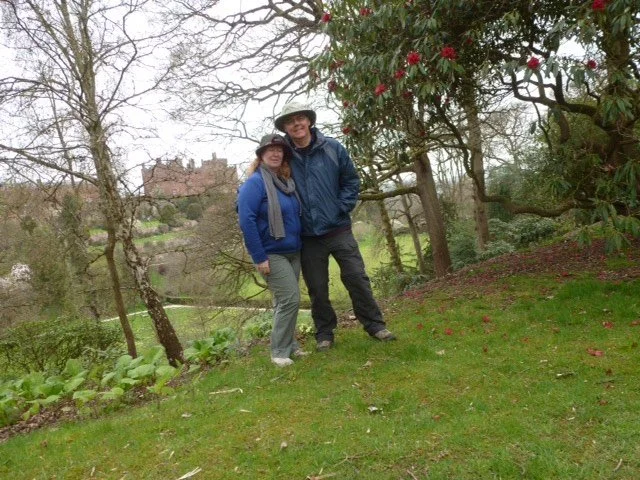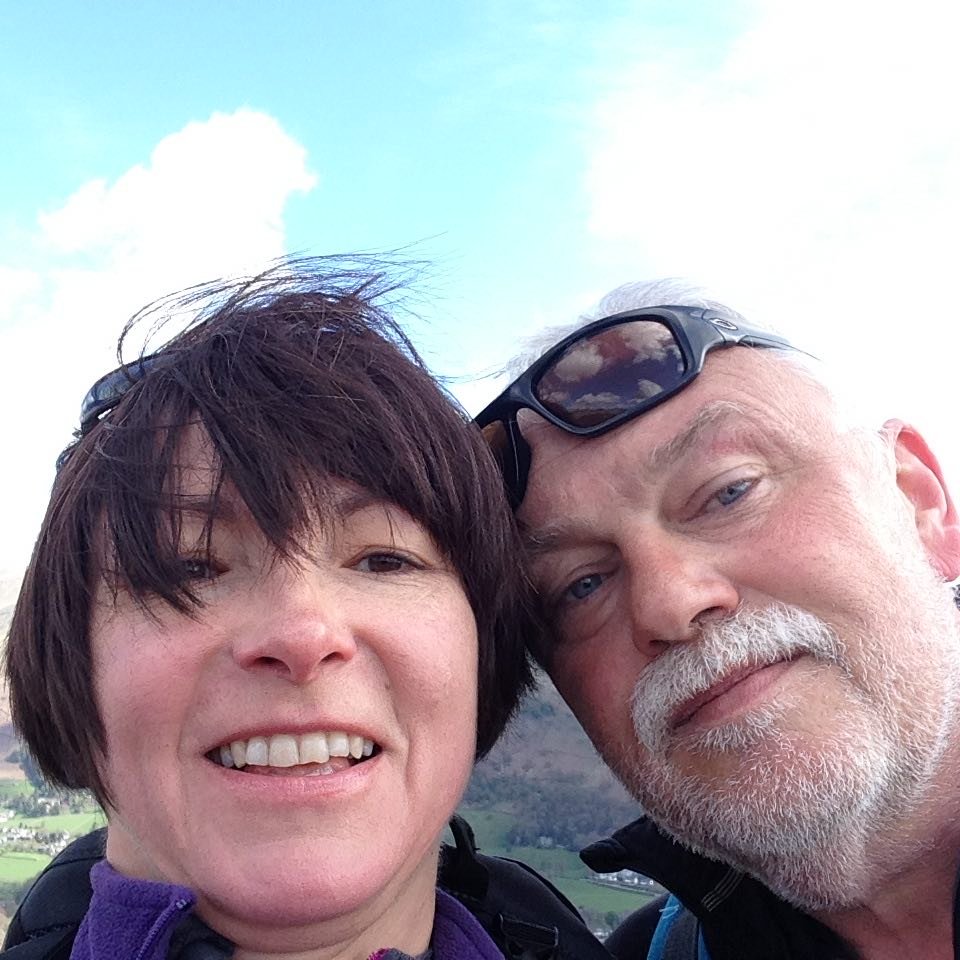Walking 1000 miles can bring us some of life’s highest moments – but it can also help us endure, and emerge from, our hardest.
‘I've healed myself by walking’
It took years for 59-year-old Julie Porter from the Isle of Man to come to terms with the loss of her daughter. But she’s discovered that #walk1000miles allows her to live her best life – and it’s exactly what Lucia would have wanted.
‘I was given my first pair of boots on my birthday. Not far from home, my son and I followed a path through a tiny gap in a wall and it led into the most beautiful woodland. I couldn’t get my head around the fact I’d been driving past that gap for 10 years and never knew it was there! It was like going through the wardrobe into Narnia. Everything on one side was familiar but, as soon as I stepped through the gap and into the woodland with the winter sun dancing through the trees, it was just magical.
‘A few years later, my dad had a fall which led to a bleed on his brain, and ultimately severe brain damage. He survived 12 months but it wasn’t him. I think I cried for about three months and, just when that started to subside, my 14-year-old daughter Lucia was killed in a car crash.
‘It was a very black time for me. I couldn’t even comfort my other kids, such was my grief, and I don’t know to this day how I pulled through.
‘Lucia left a massive hole in our lives. For months I found myself putting out a meal for her, and still remember the agony when I realised what I’d done and emptied the food into the bin. Every mother has a natural instinct to care and protect her child and that doesn’t leave you. The fact that you can’t is the hardest thing.
Lucia Porter.
‘I joined #walk1000miles in January 2020. When I started walking, I found it hard going. But with perseverance, it started to become easier. My mindset was slowly changing with the miles. I realised I’d been blessed and honoured to know Lucia, to feel her love, and I knew she’d want me to live my life. That spurred me on.
‘I completed my first 1000 miles at a place called The Switchback, which is where Lucia closed her eyes. When I made that step I’d made peace with myself. I knew she’d be so proud of me My fitness level is now off the scale. I’ve lost over three stone and my mind is healthy and positive. It sounds dramatic but this challenge has changed my life. I’ve healed myself and come to terms with my loss.
‘There is a future after losing a child. It may be impossible to see at times but everyone has the strength within them to come through it. Live your best life – you’re doing it for someone else now, too.’
‘I’m so grateful I had the challenge’
Little did Helen Lewis know how much Country Walking and #walk1000miles would come to help her.
‘I was really lucky to have such a great dad. He loved walking and had lots of Wainwright books. But sadly he died of Alzheimer’s. I bought my first Country Walking when my dad was ill, as he’d lost his language with his illness, and I liked to look at pictures with him and talk about them. Walking helped me so much when he died. I was so heartbroken. I used to walk every morning with my dog, and I booked some Peak District ranger walks, which reminded me of the walks I’d enjoyed with Dad in the hills. The challenge has really inspired me to get out every day. I’m so grateful I something so positive to focus on. Although it was a hard time, the walking kept me going and gave me a real lift. When I look back I remember a lot of the walks and how I really loved them. I enjoyed being out in nature, noticing the seasonal changes, and the exercise helped me sleep. I’m so grateful I picked up that magazine to share with my dad, as I’ve got such a lot from doing the challenge every year since.’
‘Walking is my way of honouring him’
Karen and Len.
After the death of her husband, Karen Mackrill found herself on her own for the first time in her life. But #walk1000miles has strengthened her resolve and has been her solace.
‘When my husband Len died of a brain tumour I was alone for the first time. We’d just got into walking and it played an important role in his fight against his illness. The walks gradually got shorter and slower, but continued until three weeks before he died. His positivity and determination left its mark with me, and continuing to walk is my way of honouring his memory. My solo walking journey started on Boxing Day, a week after he died. That was when I started my first #walk1000miles challenge. It was a reason to get out of bed each day. I finished that first challenge the trekking up a mountain in Myanmar to spend a night in a Buddhist monastery – a feat I’m still amazed I did!
‘Walking really has been a lifesaver some days. The challenge of walking solo has given me more confidence, and walking has been my solace, whether with friends or on my own.’
‘Walking kept me alive’
Sandra and Richard.
For Sandra Watson, #walk1000miles has helped her through the darkest days following the sudden death of her husband.
‘My husband Richard passed his love of the Lake District on to me and we’d got into the habit of going at least a couple of times every year. In 2020 we were in the Lakes for our 31st wedding anniversary when I slipped on wet rock and broke my left wrist. Richard dropped me off at our local hospital – and I never saw him again.
‘He couldn’t come in due to Covid. A police officer came to the hospital to tell me he’d been killed by a drugged driver. My life was ripped apart.
‘Two years later, I’m just starting to feel that I’m emerging from the depths of my grief, and it has taken me some time to decide that I want to live. Walking has helped me to find peace. It made me get out of bed. It was a vital part of my grieving process and enabled me to deal with my thoughts and help to control the PTSD attacks. It has helped to keep me sane, and has kept me alive through some very dark times.’
‘I now have a purpose in life’
Rachel with mum Debbie.
‘I lost my daughter Rachel last year. She died of colon cancer, which went undiagnosed all through the pandemic. For many months I didn’t know if I could go on with my life. It suddenly had no meaning at all, and although I wasn’t suicidal, I didn’t really want to live. I spoke to a grief counsellor, who encouraged me to walk every day. It helped immediately, and I still notice how much it improves my mood when I walk. I feel I now have a purpose in my life. I feel my daughter would want me to live my best life, and I believe walking helps my mental health to enable me to do this. I would even go as far as saying walking saved me.’ Debbie Yauch
Walking kept me going’
‘It gave me focus and a goal, and the physical act of walking created endorphins that lifted my mood. I still walk when I’m feeling down, and always come home feeling better for it.’
Jill Hobbs
‘It was and is my saviour’
‘My husband suddenly died seven years ago, leaving me a widow at 50 with two small children and an older one. Our life was torn apart, but walking was and is my saviour. It helps me breathe and keep sane.’ Alison Green
‘#walk1000miles got me through’
‘My husband and I were both keen walkers, but sadly he took his own life. I continued walking with family and friends, but then came the pandemic. It was being committed to #walk1000miles that got me through, as walking became even more my solace.’
Betty Macdougall











